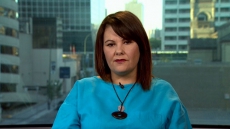OTTAWA — Statistics Canada reports GDP fell in second quarter, indicating economy was in recession in first half of 2015.
Canada's gross domestic product shrank 0.5 per cent on an annualized basis, somewhat less than estimates of a 1.0 per cent decline.
HARPER DEFLECTS STATSCAN RECESSION REPORT AS NDP AND LIBERALS POUNCE
OTTAWA — Fresh data showing that Canada's economy now meets the definition of a recession sent immediate ripples across the federal election campaign trail this morning.
Statistics Canada reported that the economy contracted at an annual pace of 0.5 per cent in the second quarter of 2015. It's the second straight quarter of contraction, fitting the technical definition of a recession.
But Stephen Harper tried to find a silver lining — the Conservative leader seized on the agency's finding that the economy began to bounce back in June as GDP grew by 0.5 per cent after shrinking over five straight months.
"Elsewhere there's growth, and today one of the greatest monthly growths occurred in June, so it's clear that the Canadian economy is growing," the prime minister said in Burlington, Ont. where he pledged new support for Canadian manufacturers.
Harper said the Conservative plan of a balanced budget, low taxes and affordable investments was the best course for the country in the face of greater global problems.
"If we change plans, we'll have a permanent recession like is occurring in many other countries. We're on the right track," the prime minister said.
But New Democrat candidate Andrew Thomson, a former Saskatchewan finance minister, says today's numbers mean Conservative economic policies aren't working.
"The forecast today confirms that Stephen Harper is presiding over Canada's second recession in only seven years," Thomson told a press conference in Ottawa, while NDP Leader Tom Mulcair was in British Columbia for events later in the day.
"This is not about one day's statistics," he added. "Under Stephen Harper, this has been Canada's lost decade."
He accused Harper's government of 10 years of job losses, allowing infrastructure to crumble and for giving tax breaks to the wealthy while the middle class struggles.
Liberal Leader Justin Trudeau said he agreed with a suggestion that the size of the recession might be marginal. But he said the bigger picture is that Canadians are struggling in an economy being hampered by low growth.
Trudeau said Canadians have been living with the reality of a weak economy for months now, and don't need official numbers to confirm what they already know.

"What they would have needed is that politicians rather than getting hung up on definitions, invest in their future and in their jobs," Trudeau said in Gatineau, Que.
Trudeau reiterated his platform plank — which distinguishes the Liberals from the Conservatives and the NDP — to run deficits before balancing the budget in 2019 in order to spur growth by investing infrastructure.
"That's why our plan will invest in real growth and isn't really dependent on this morning's announcement."
ECONOMY SHRINKS IN SECOND QUARTER, PUSHES CANADA INTO TECHNICAL RECESSION
OTTAWA — Canada's economy hit reverse for the second straight quarter of 2015 — knocking the country backwards into its first technical recession in six years, fresh Statistics Canada data revealed Tuesday.
But the data suggests the recessionary dip could, perhaps, already be something of the past.
The federal agency said real gross domestic product contracted at an annual pace of 0.5 per cent in the April-June quarter, which followed a revised decline of 0.8 per cent in the first three months of 2015 from its original estimate of a 0.6 per cent drop.
However, there were positives tucked in the highly anticipated figures that almost immediately echoed on the campaign trail.
The second-quarter drop was only half as steep as a consensus of economists had predicted and there was evidence that the decline had finally bottomed out.
Canada's GDP climbed in the month of June by 0.5 per cent after shrinking over the first five months. The last time the economy experienced a one-month gain of at least 0.5 per cent was July 2013 when it grew by 0.63 per cent.
That June increase was led by a 3.1 per cent boost in natural resources extraction — the category's first gain following seven consecutive months of decline.
"There's nothing to cheer about in the Canadian GDP numbers, but there's no reason for any more booing than we've already had," CIBC chief economist Avery Shenfeld said Tuesday.
"The economy is contracting through the first half of the year, but the solid gain in June suggests that we'll at least get a breather with a return to growth in the third quarter."
The new batch of data added fuel to the heated, ongoing political debate over how best to respond to the weakened economy as parties battle for support ahead of the Oct. 19 federal election.

On Tuesday, Prime Minister Stephen Harper, whose Conservative party has pinned its re-election hopes on its economic record, tried to highlight the positives in the new data.
"The Canadian economy as a whole is now growing, according to the June figures," Harper told reporters.
"That is the reality of the situation — it is good news."
He also reiterated his stay-the-course mantra, insisting the country must ride out external economic and market turbulence whipped up in places like China.
The Tory leader has frequently cited forecasts that predict the economy will rebound in the second half of the year, including a projection by the Bank of Canada.
The central bank, however, has downgraded its growth forecast for 2015 and cut its trendsetting interest rate twice this year to cushion the blow of low crude prices.
The hobbled economy has so far shaped up to be the primary issue of the campaign — and Harper's opponents have used his record as a bull's-eye for their attacks.
The last time the economy contracted over two consecutive quarters was in 2009 during the Great Recession, when GDP pulled back by 8.7 per cent in the first quarter and 3.6 per cent in the second.
Drilling deeper into the second-quarter data, the numbers showed the decline in the economy reached beyond natural resources extraction, which contracted by 4.5 per cent.
Business investment in machinery and equipment dropped 4.6 per cent while non-residential structures fell 2.3 per cent, the third straight quarterly decline.
On the growth side, a considerable amount of the gain in the quarter came from household consumption — rising by 0.6 per cent — at a time when interest rates remained low. As a result, the household savings rate declined.

Exports also crept up in the second quarter by 0.1 per cent after contracting for two consecutive quarters.
Meanwhile, positives in the June data suggest the expected turnaround forecasters have been banking on could be underway.
On a monthly basis, Statistics Canada said wholesale trade rose by one per cent in June after a 1.1-per-cent decrease in May and a 1.6-per-cent in April.
Manufacturing output rose by 0.4 per cent after contracting by 1.6 per cent in May.
The finance and insurance sector grew by 0.7 per cent in June and the arts and entertainment industry rose by 6.4 per cent, thanks in large part to Canada's role as host of the FIFA Women's World Cup.
"While a technical recession was confirmed, its amplitude is relatively mild and there is every suggestion that it has already ended," Jimmy Jean, an economist with Desjardins Capital Markets wrote in a note to clients.
Shenfeld said, however, while the early signposts are positive, the further retreat in oil prices recently could lead to continued pullback in capital spending in the energy sector.
"It's not like we're out of the woods yet," Shenfeld said.
The quarterly reading Tuesday is also expected to intensify the economic debate over the term technical recession.
Harper has side-stepped campaign-trail questions about whether Canada was in recession this year. He also declined to define a recession when asked about it earlier this week, saying he thought it was more important to "describe the reality of the situation rather than to have labels."
Shenfeld said it's one thing to call it a "technical" recession, but he noted that any recession he's ever seen in historical data has also had a decline in employment.
"We haven't yet seen a net decline in employment that would characterize every recession that Canada has ever had," he said.
FIVE THINGS TO KNOW ABOUT STATSCAN'S LATEST NUMBERS ON ECONOMIC GROWTH

OTTAWA — New figures from Statistics Canada show the economy contracted for two consecutive quarters in the first six months of 2015, which meets the technical definition of a recession.
Here are five things to know about the numbers. An economic rebound could be underway: Even even though the economy declined at annual pace of 0.5 per cent over the second quarter as a whole, it grew 0.5 per cent in June, the final month of the quarter. The June increase was the first one-month spurt in real gross domestic product to hit 0.5 per cent since it rose 0.63 per cent in July 2013.
A large chunk of second-quarter gains came on the backs of households: The data shows that household consumption climbed 0.6 per cent at a time when interest rates remained low. As a result, household savings dipped to 4.0 per cent from 5.2 per cent in the first quarter. Transport purchases — with help from 2.9 per cent growth in vehicle purchases — were the biggest component with a 1.5 per cent increase.
The oil-price collapse delivered a big blow to economic growth: Natural resources, including mining, quarrying oil and gas extraction, contracted by 4.5 per cent in the second quarter — for the second straight quarter. The decline was mostly tied to a 5.7 per cent drop in the non-conventional oil extraction sector.
Exports creep up: The numbers reveal that exports edged upwards in the second quarter by 0.1 per cent following two quarters of contraction. Goods exports gained by 0.2 per cent, reversing a 0.5 per cent decline in the first quarter. The export of motor vehicles and parts rose by 4.7 per cent, while crude oil and crude bitumen climbed by 3.3 per cent.

Business investment continued to struggle: Business investment in machinery and equipment fell 4.6 per cent in the second quarter, while non-residential structures tumbled 2.3 per cent for a third consecutive quarterly decline. The drop was fuelled by lower investment in non-residential buildings, which was down 1.8 per cent, as well as the 2.4-per-cent decline in engineering structures.





